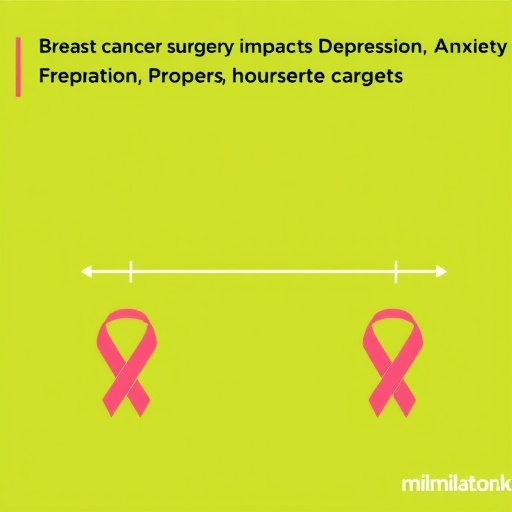
In a groundbreaking synthesis of existing research, scientists have unveiled compelling evidence that breast cancer surgery not only combats the physical manifestations of the disease but also significantly alleviates psychological distress among patients. This extensive systematic review and meta-analysis, published in the renowned journal BMC Cancer, scrutinizes the nuanced impacts of various surgical interventions on levels of depression and anxiety. The findings present a paradigm shift in understanding the broader benefits of breast cancer surgery, highlighting mental health improvements as a critical outcome alongside physical recovery.
Breast cancer remains one of the most prevalent malignancies globally, and surgery is a cornerstone in its management. However, the psychological toll exacted by both the diagnosis and treatment has been widely acknowledged but insufficiently quantified. Previous studies suggested varied emotional responses tied to different surgical types, yet no comprehensive analysis had conclusively measured the overall changes in mood-related symptoms. This latest research addresses that gap, systematically analyzing data collected from a global corpus of scientific literature to offer robust, evidence-based conclusions.
Using rigorous methodologies adhering to the PRISMA 2020 standards, the research team conducted an exhaustive database search encompassing PubMed, Scopus, Web of Science, and Embase. They identified 1,576 potential articles before meticulous screening narrowed the dataset to 13 high-quality studies. The meta-analytic approach enabled the aggregation of diverse datasets, amplifying the statistical power to detect subtle but meaningful changes in psychological states post-surgery, thus enabling the derivation of statistically significant outcomes across heterogeneous populations.
Central to their findings was a demonstrable decrease in both depressive and anxiety symptoms among breast cancer surgery patients. Statistical analyses revealed a standardized mean difference (SMD) of -0.14 in depression scores, indicating a modest but reliable improvement. More strikingly, anxiety levels dropped with an SMD of -0.42, affirming a substantial reduction. These figures underscore the dual benefit of surgical treatment—not only extending survival but also promoting mental well-being, which is essential for holistic recovery.
Diving deeper into surgical modalities, the meta-analysis distinguished between mastectomy, breast-conserving surgery, and reconstructive procedures. Mastectomy, the more radical option involving complete removal of breast tissue, was surprisingly associated with the most consistent improvements in emotional health markers. Patients undergoing this procedure experienced significant relief from both depressive and anxious symptoms, suggesting that definitive surgical resolution may play a critical role in alleviating psychological burdens linked to cancer uncertainty and body image distress.
Conversely, the outcomes following breast-conserving surgery and reconstruction proved more variable. This heterogeneity might stem from differences in patient expectations, the complexity of postoperative recovery, or psychosocial factors related to body image and identity. The analysis revealed no universally consistent pattern for these interventions, pointing to the need for personalized psychological support tailored to individual treatment trajectories and coping mechanisms.
The implications of these discoveries extend far beyond clinical surgery rooms. By establishing a link between surgical treatment and mental health improvements, the study paves the way for integrated care frameworks that prioritize psychological assessment and intervention alongside oncological management. Understanding how surgical decisions affect mood disorders may embolden multidisciplinary teams to better support patient resilience and quality of life during and after treatment.
This research also raises important questions about the timing and sustainability of psychological benefits following surgery. While immediate post-operative reductions in anxiety and depression are promising, long-term studies are essential to ascertain whether these effects persist or evolve over time. Chronic psychological distress remains a critical challenge in cancer survivorship, and elucidating these dynamics will inform the development of enduring support strategies.
Moreover, the findings provoke a reevaluation of surgical counseling practices. Traditionally, discussions about breast cancer surgery focus primarily on survival rates, physical risks, and cosmetic outcomes. Incorporating evidence about mental health trajectories could profoundly influence decision-making processes, empowering patients with a more comprehensive understanding of potential benefits and challenges associated with each surgical option.
The study’s robust adherence to systematic review protocols and meta-analytic techniques lends credibility and generalizability to the findings. Nevertheless, the authors acknowledge limitations inherent in analyzing diverse studies with varying methodologies, populations, and psychological assessment tools. Future investigations could focus on prospective controlled trials with standardized outcome measures to validate and refine these insights.
Furthermore, the complex interplay between biological, psychological, and social factors in breast cancer recovery underscores the necessity for holistic research approaches. Psychoneuroimmunology, for example, offers a promising avenue to explore how surgical stress and subsequent emotional changes might influence immune function and cancer progression. Integrating such interdisciplinary perspectives could revolutionize treatment paradigms.
In conclusion, this systematic review and meta-analysis signify a milestone in breast cancer research by demonstrating that surgical intervention is associated not only with eradication of disease but also with measurable improvements in depression and anxiety. Mastectomy, in particular, emerges as a procedure linked with significant psychological relief, challenging preconceived notions about its emotional toll. These insights advocate for comprehensive patient care models encompassing both physical and mental health, thereby enhancing overall well-being and recovery outcomes for breast cancer patients worldwide.
As the oncology community continues to strive toward personalized medicine, integrating psychological dimensions into surgical planning may transform the patient experience. This study underscores the vital importance of recognizing and addressing mental health needs as an integral component of cancer treatment, ultimately aiming for survivorship that embraces both life expectancy and life quality.
Subject of Research:
Article Title: Effect of breast cancer surgery on levels of depression and anxiety: a systematic review and meta-analysis
Article References:
Movahed, F., Dehbozorgi, M., Goodarzi, S. et al. Effect of breast cancer surgery on levels of depression and anxiety: a systematic review and meta-analysis. BMC Cancer 25, 889 (2025). https://doi.org/10.1186/s12885-025-14277-8
Image Credits: Scienmag.com
DOI: https://doi.org/10.1186/s12885-025-14277-8
Tags: breast cancer surgery mental health impactsdepression anxiety levels post-surgeryeffects of surgery on mental well-beingemotional responses to cancer treatmentglobal research on breast cancer outcomesimplications of surgical treatment on mood disordersmeta-analysis on breast cancer surgeryPRISMA 2020 guidelines in researchpsychological benefits of surgical interventionsquantifying psychological distress in cancer patientssystematic review breast cancer treatmentunderstanding emotional health in cancer recovery





